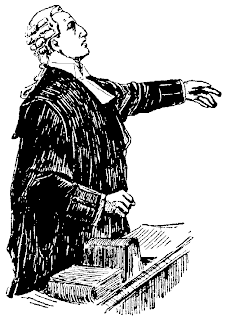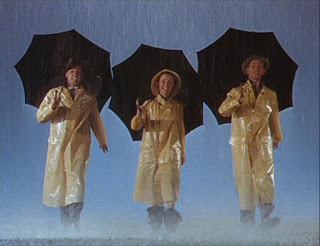Dick the Butcher. The first thing we do, let's kill all the lawyers.
(Henry VI Part 2, 4.2.2379)
I couldn't get away without referencing this, which is without doubt the most famous line in all the Henry VI plays. There's something very funny about the punchy brevity of the declaration, and we can all to some degree sympathize with the idea - there is a certain gleeful appeal to the idea of taking down this group of educated people whose mysterious and labyrinthine knowledge somehow holds such sway over all of our lives.
^a lawyer^
Kill them all, says the Butcher
Dick the Butcher, as a representative of the discontent of the common people with the power structure in England, channels his frustration and hostility through a revolt led by the rabble-rousing revolutionary populist Jack Cade. Cade, a leader who is in every way the antithesis of the weak ruler Henry VI, is an extraordinary character - Shakespeare paints him as a charismatic and compelling orator who is able to sweep crowds into a frenzy.
In a play cycle dominated by the concerns of the nobility, Jack Cade and his men, as commoners with homely speech and down-to-earth references, come across at first as somewhat comic characters. The editors of the Norton Shakespeare speculate that Cade might have been played by the actor Will Kempe, the "clown" who usually played the funny characters in Shakespeare's earlier plays - this theory is bolstered by the sort of silliness surrounding him that is seen in this exchange:
Dick the Butcher. I have a suit unto your lordship....
In a play cycle dominated by the concerns of the nobility, Jack Cade and his men, as commoners with homely speech and down-to-earth references, come across at first as somewhat comic characters. The editors of the Norton Shakespeare speculate that Cade might have been played by the actor Will Kempe, the "clown" who usually played the funny characters in Shakespeare's earlier plays - this theory is bolstered by the sort of silliness surrounding him that is seen in this exchange:
Dick the Butcher. I have a suit unto your lordship....
Only that the laws of England may come out of your mouth.
....
Smith the Weaver. [Aside] Nay, John, it will be stinking law for his
breath stinks with eating toasted cheese.
breath stinks with eating toasted cheese.
(4.7.2625, 2632).
This positioning of the revolutionaries as buffoons reminds me of some of the stories by the hilarious 20th century comic novelist P.G. Wodehouse, whose tales of incompetent English aristocrats
English aristocrats often include equally inept closet Communists who secretly long for the overthrow of the government - the day when the blood of their employers will run in rivers down London's Park Lane.
often include equally inept closet Communists who secretly long for the overthrow of the government - the day when the blood of their employers will run in rivers down London's Park Lane.
Bertie Wooster, P.G. Wodehouse's daffy aristocrat, and manservant Jeeves (as played by Hugh Laurie and Stephen Fry in the B.B.C. Jeeves and Wooster series ). Bertie vaguely fears a coming Revolution.
). Bertie vaguely fears a coming Revolution.
Like Wodehouse, however, Shakespeare's sometime light treatment of the revolutionaries is based on very real social anxieties about class conflict and the consequences of bloody uprisings. Thus, when we see Cade as more than a ridiculous pretender to power, but as a serious contender for the leadership of England, the joke doesn't seem quite so appealing any more. We thought that uppity lawyers interpreting statutes were bad? How about no law at all?
Jack Cade. I have thought upon it, it shall be so. Away, burn
all the records of the realm: my mouth shall be
the parliament of England.
all the records of the realm: my mouth shall be
the parliament of England.
(4.7.2633-2635)
We're outraged over the haughty attitudes of the corrupt nobles towards the concerns of the commoners, ripping up their written petitions (1.2.427-431) - but under Cade, we find out that there could be no written petions because no one would be permitted to learn to read and write! This is shown by Cade's "trial" of an educated man, the Clerk of Chatham:
Smith the Weaver. The clerk of Chatham: he can write and read ...
...
Jack Cade. ... Dost thou use to write thy name? or
hast thou a mark to thyself, like an honest
plain-dealing man?
hast thou a mark to thyself, like an honest
plain-dealing man?
Jack Cade. Away with him, I say! hang him with his pen and
ink-horn about his neck.
ink-horn about his neck.
(4.2.2389-2410)
Again, Cade's antagonism against the educated comes out:
Cade. ...and more than that, he can speak French; and
therefore he is a traitor.
therefore he is a traitor.
(4.2.2470)
What is astounding to me - and what I believe changes the modern audience's reaction to Jack Cade, making the play more painful and difficult to read - is how exactly the demands and rhetoric of Shakespeare's Jack Cade match the real life goals, policies, and actions of two of the biggest butchers of the 20th century, responsible for literally countless millions of deaths, Stalin and Mao.
(The baddest Bad Guys)
It's uncanny how it's all the same.
Class warfare, pitting the demonized rich against the poor? Check.
Promises of price-fixing, manipulating food production and supply? Check.
Reprisals against and persecution of the educated? Check.
Effective populist demagoguery masking the leader's intentions to seize absolute and brutal power? Check.
I guess people - and politics - just don't change, and that Shakespeare very clearly understood the power and danger of an unscrupulous leader with the power of a mob behind him. In the 20th century, the world got to see what would happen if Jack Cade got his way. Kill the lawyers? Not quite so funny any more.



































